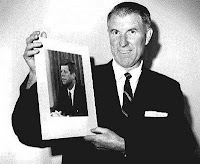I'll bet you can't wait for this one.
I wasn't expecting much either, but stick with me.
Around 1986 or 87 a friend of mine dragged me to an event at the
Virginia Bader Fine Arts Gallery in Alexandria, Virginia for a showing of a new series of
Aviation Art. This particular show was highlighting the airplanes of World War Two.
 |
| "Hurricane Scramble" by Robert Taylor |
But, I soon realized that the paintings were just
part of the show. when I heard the gentleman standing next to large painting labeled
Hurricane Scramble say that he was very familiar with that plane because during the summer and autumn of 1940. he would sometimes spend 4 or 5 hours a day in “one of those.
He introduced himself to me as
Peter Brothers, and he said his only form of relaxation during what came to be called "the Battle of Britain, "was on returning from combat when he would open the cockpit canopy and light up a cigarette.
Brothers personally shot down a number of German bombers and fighter planes.
 |
| Peter Townsend and Virginia Bader |
He introduced me to the man standing nearby as a man who "also spent many hours in
Hawker Hurricanes..." .and in fact was the pilot who shot the first German plane out of the ski over Britain in 1940.
Peter Townsend was his name. (Like most Americans, I remembered his name more for his romantic association with
Princess Margaret rather than his daring WW2 heroics.)
It soon became apparent that the many British accented conversations going on around me belonged to some of the best
Royal Air Force pilots of World War Two. Men who
Winston Churchill called
“The FEW.”(After visiting an RAF Operations Room during a day of watching one of the battles
Churchill told
Major Major General Hastings Ismay ‘
Don’t speak to me, I have never been so moved’. After several minutes of silence he said
‘Never in the field of human conflict has so much been owed by so many to so few.’ He would later use almost those exact words in one of his most famous speeches to parliament.)
It was truly an evening to tell my grandchildren about.
It wasn't until later that I learned how such an historic gathering of heroes could possibly have been organized for an “art show.”
Virginia Bader (the owner of the gallery) was a cousin of
Sir Douglas Bader, the most famous fighter pilot Britain has ever known.
 |
| Douglas Bader |
“Bader joined the RAF in 1928, and was commissioned in 1930. In December 1931, while attempting some aerobatics, he crashed and lost both his legs. After the outbreak of the Second World War in 1939, however, Bader returned to the RAF and was accepted as a pilot.On September 7 1940 Bader and the pilots of three RAF squadrons engaged the Luftwaffe in battle over London. Twenty German planes were destroyed, 10 by Bader’s squadron. However in August 1941 his combat days came to an end when he was forced to bail out over northern France and was captured. -Wikipedia”The fact that Bader had lost his legs in that accident years before actually saved his life, because one of his prosthetic legs had become trapped in his aircraft.....and had been pulled off when his parachute opened...thereby separating Bader from his falling plane.
German forces treated their famous prisoner with great respect. He and General
Adolph Galland, Germany's most famous fighter pilot, became friends.
Galland arranged safe passage for the British to air drop a new prosthetic leg for
Bader.He might not have been so gracious had he known that after
"Operation Leg Drop," the British plane would continue on to bomb other German installations.
While captive,
Bader was a thorn in the side of the Germans. He was a master of what the RAF personnel called "
goon-baiting"... considering it his duty to cause as much trouble to the enemy as possible.
He attempted to escape so often that the Germans threatened to take away his artificial legs. Finally, they just sent him to the
“escape-proof” Colditz Castle....where he remained until the war's end.
Bader's reputation as the “leader of the few” was enhanced by the 1954 best selling book and film,
Reach for the Sky.After Bader's death in 1982 his family and friends, many of whom had flown with him during the war formed
THE DOUGLAS BADER FOUNDATION a charity honoring his contribution and work on behalf of the disabled. The Foundation's motto is,
"A person who fights back is not disabled, but inspired." |
| General Adolph Galland |
Surviving airmen from both the British and the German sides are strong supporters of the Bader Foundation. Bader's old friend,
General Adolph Galland was in attendance and spoke that evening. He told of the time he had invited Bader to speak at a reunion of his fellow Luftwaffe pilots. He said that Bader looked around the rather crowded room and remarked,
"My God, I didn't realize that we had left so many of you bastards alive."-Lee  |
| My autographed program from that magic night. -Ed |


































